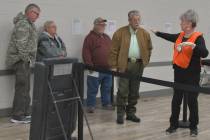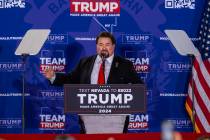EDITORIAL: Ruling relegates private property protections ‘to the trash can’
The U.S. Supreme Court last year bolstered the Fourth Amendment by refusing to allow the authorities to enter private homes without a warrant in pursuit of misdemeanor suspects. But a California case highlights that there’s much more work to be done when it comes to protecting Americans from “unreasonable searches and seizures.”
Last year, FBI agents raided the office of U.S. Private Vaults in Southern California, armed with a warrant and allegations against the company itself. As part of the operation, the government seized the contents of scores of safe deposit boxes in which customers kept their valuables even though the indictment did not accuse any of them of wrongdoing.
To make matters worse, an attorney for the customers wrote in the Orange County Register, the FBI refused “to return any customer’s stuff until he or she comes forward, identifies him or herself as the box’s owner, and submits to an FBI ‘investigation.’ In other words, people must prove their own innocence to secure their property’s return.”
This is, of course, backward justice. The burden should not fall upon the suspect. It should be the government’s obligation to prove that the accused is guilty.
Nevertheless, a federal judge last week ruled that safe deposit box owners who sued over the intrusive law enforcement action “failed to prove” that the FBI had “an impermissible investigatory motive” when it embarked upon a fishing expedition far in excess of the parameters of the warrant.
“There can be no question that the government expected, or even hoped, to find criminal evidence during its inventory,” Judge Gary Klausner wrote, acknowledging that the plaintiffs’ attorneys “have certainly shown that the government had a dual motive in inventorying the contents of each deposit box.” But, he said, “that is not enough. They must demonstrate that the improper investigatory motive was the only reason that the government opened the safe deposit boxes, and they have not done so.”
Judge Klausner’s reasoning ignores the limits the Bill of Rights imposes on law enforcement and “effectively relegates any protections for private property to the trash can,” Eric Boehm of Reason magazine wrote.
An attorney for the safe deposit box owners pointed out that the ruling gives carte blanche to law enforcement to expand civil forfeiture operations in which it seizes property from people who are never charged with any crime. He vowed an immediate appeal to the 9th U.S. Circuit Court of Appeals.
The appeals court should reaffirm the fact that the Bill of Rights wasn’t intended to make life easier for the government, but instead secures certain unalienable rights for American citizens. If it fails to do so, it will once again be up to the Supreme Court to step in.
















